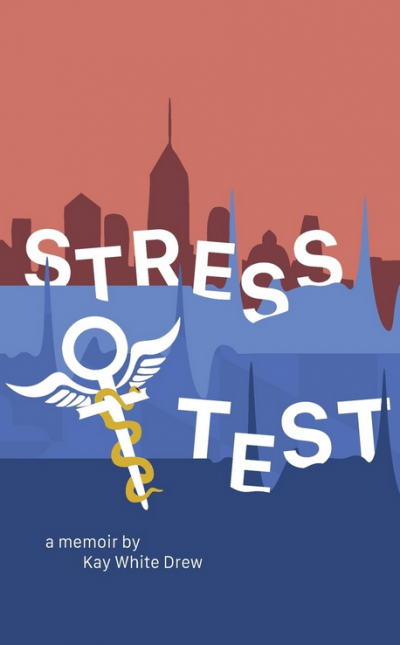Stress Test: A Memoir
- By Kay White Drew
- Apprentice House Press
- 348 pp.
- Reviewed by Alexandra Grabbe
- June 28, 2024
It wasn’t easy being a female med student in the 1970s.

In Stress Test, Kay White Drew chronicles her years at the University of Maryland Medical School in Baltimore. Recent memoirs, often penned by famous people, focus on traumatic events like sexual abuse or figuring out gender identity. Drew, a Wellesley alum, isn’t famous but decided others could benefit from her experiences as a med student and her reflections on that crucial period in her life. It was refreshing to read about the day-to-day activities that were stressful at the time (hence the book’s title) and know the doctor who emerged managed to land on her feet.
The memoir provides an informed evaluation of the pluses and minuses of medical-student life in the 1970s. We come to understand the thrill of pursuing a noble profession, as well as the fear of ending up among those obliged to drop out of it. Readers join Drew in the lecture hall, in the on-call room, and at patients’ bedsides. We are with her when she loses her first preemie at the end of a 24-hour shift:
“None of us would emerge from our training unscathed. That was the downside of the learning process, the part nothing — and no one — could prepare you for.”
The book explores traumatic personal events, too. During her first year of medical school, for instance, Drew’s mother succumbs to cancer. Several years later, a rotation takes her to the very ward where Mom died. Drew will also struggle with the death of a roommate and chastise herself for not having realized the young woman suffered from the kind of despair that can drive a person to commit suicide.
A compelling theme throughout is the treatment of women by the mostly male teachers and students, who were “uncomfortable having women on the team.” Fifty years ago, in fact, so few women became physicians that Drew’s patients often assume she’s a nurse. To her surprise, the doctors she works with prefer to date outside the profession, and she soon discovers an imperative: figure out how to act in the company of male classmates and downplay her femininity. Seeing a slide of a naked woman slipped into a lecture bothers her, but it’s the casual disparagement of female patients that comes as a greater shock:
“It deeply disturbed me to witness women being treated this way. I resolved to do better with my own patients.”
She’s unflinchingly honest in her account of those years, from the pot-fueled discussion she once engaged in with roommates to the revelation that she had a months-long affair with a Black mentor, the head of neuroscience research at the university. Their unconventional relationship (Drew is white) is well described, although her mentions of numerous other boyfriends doesn’t really add to the narrative.
Fortunately, she emphasizes the pleasure of helping people recover from illness, which makes for an uplifting read. But what I found particularly worthwhile were the interesting medical facts sprinkled here and there, including that the kidney is perhaps the most complex organ aside from the brain. Also fascinating was learning how important it is for medical students not to skip breakfast prior to a full day (and often night) of work and observing the author’s evolving attitude as she arrives at “gradual acceptance of what an awesome responsibility it was to be a doctor, to hold a patient’s — especially a child’s — life in your hands.”
At the end of her training, Drew proudly adds “MD” to her signature and prepares for the adventure to come. “Because of that white skirt and what it represented,” she writes, “my life would never be the same.”
Alexandra Grabbe is a former talk-show host in Paris, a former green innkeeper on Cape Cod, and a forever writer who grew up in Washington, DC, playing Wiffle ball with her brother on the front steps of their home in American University Park. She attended the Madeira School and Vassar College. Her most recent nonfiction appears in Next Avenue. Academic Studies Press’ fiction imprint Cherry Orchard Books published The Nansen Factor: Refugee Stories, a collection of her linked short stories, in May.

